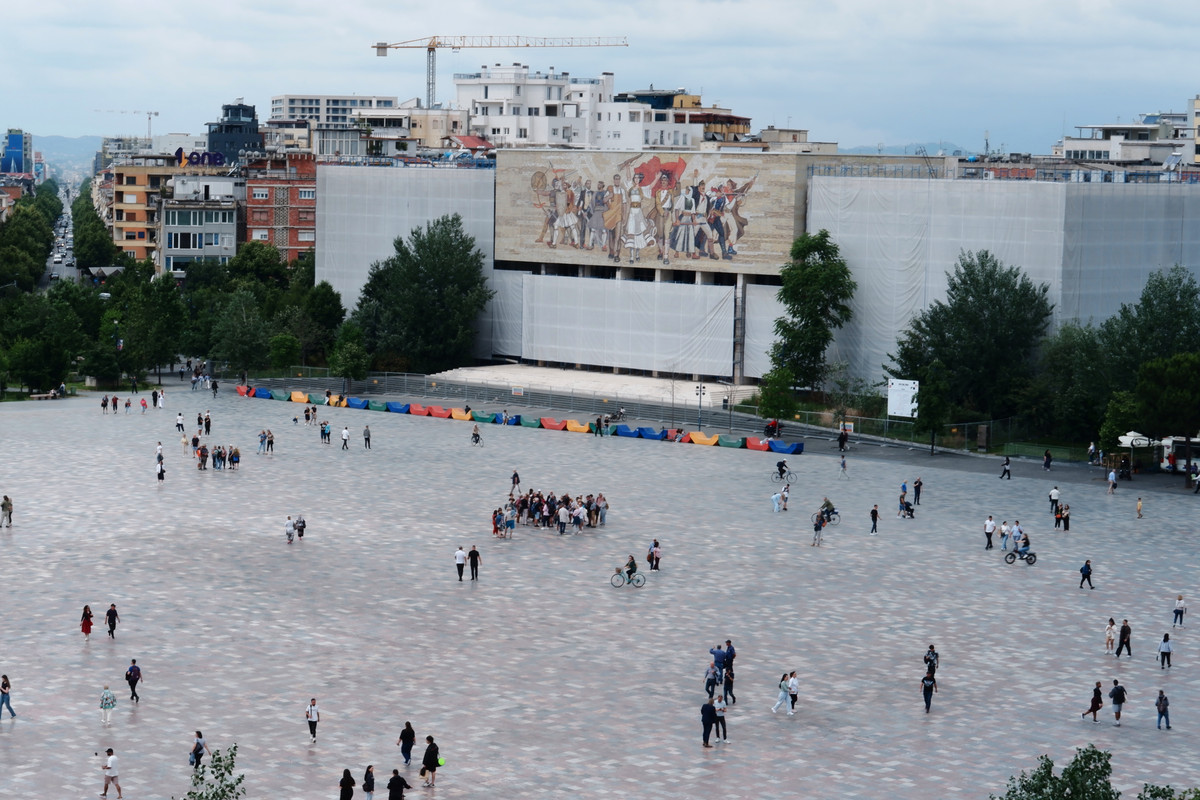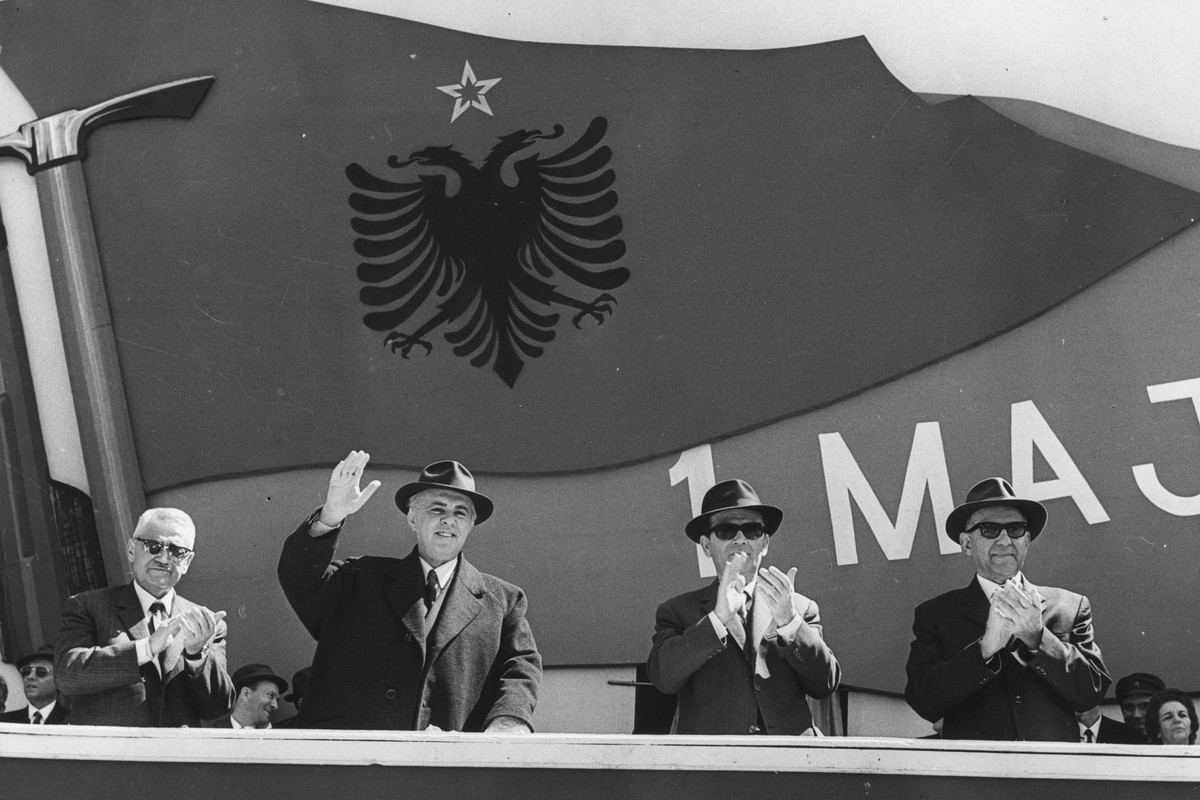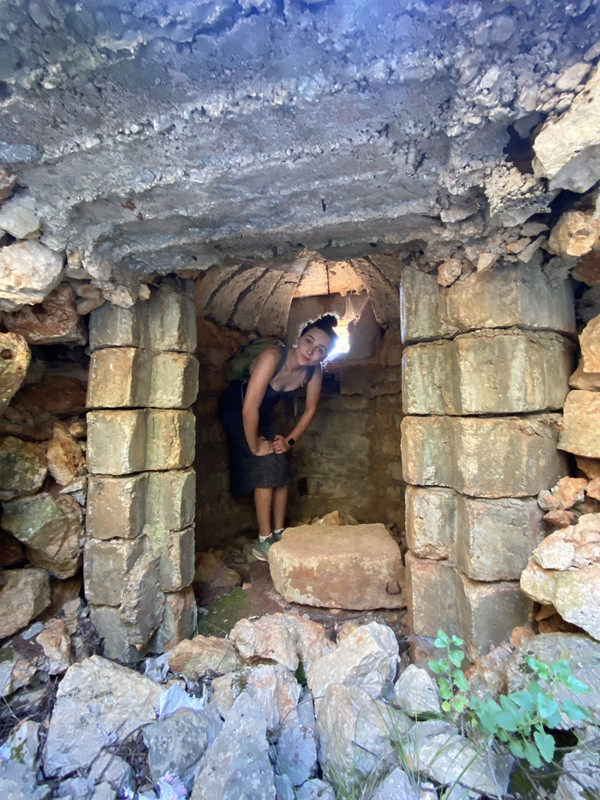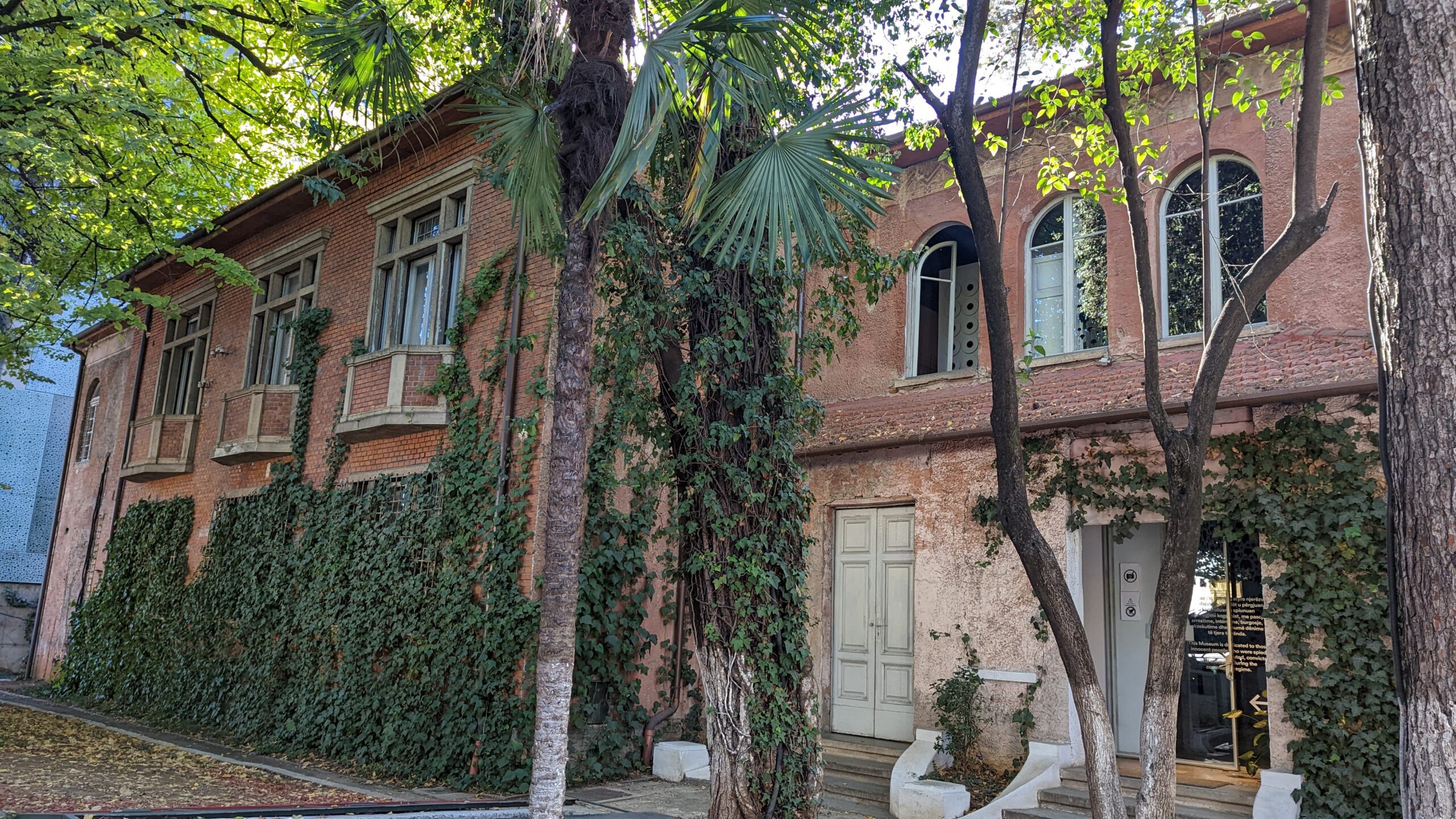We walked completely past the House of Leaves when we first tried to visit. This is a testament to the deliberately inconspicuous nature of the building. Shaded behind vines and a few tall trees, it looks like any ordinary two-story brick villa. Built in 1931 as a private obstetrics clinic, the house was once a safe space for pregnant women. But with bitter irony, the building was commandeered by the Gestapo during the Nazi occupation of Albania, before it morphed into the headquarters of the Sigurimi, the secret police of the Communist regime. The building that once brought life was repurposed to monitor it — turned into a centre for surveillance, suspicion, and control.
If I had to describe the museum in one word, it would be chilling. Not in a far-fetched way, but because it was real and recent. The communist regime, under Dictator Enver Hoxha, repressed its people for 45 years from 1946 until 1991. The House of Leaves unearthed a massive network of listening devices, hidden cameras and informants that were used to exert authoritarian control over its people- people still alive today — people I’ve seen on the bus, playing chess, or out to lunch with their grandchildren. Documents show around 100,000 people were persecuted — imprisoned, tortured, executed, or sent to labour camps. The repression was systematic and long lasting. Entire families were punished for the alleged “crimes” of a single relative, children were barred from education on the basis of their family’s political history.


Skanderberg square, featuring a giant socialist mosaic
Dictator Enver Hoxha waving (Image Source: NZZ)
One story that stuck with me came from our Albanian friend Refat. He told me that when Enver Hoxha died, the regime didn’t end for another six years. On the day of his death, everyone cried — out of grief or fear of being denounced. A friend of Refat’s, then only a fifteen-year-old girl, was working in the fields when it happened. As she walked home from work, she whistled a tune to herself. A neighbor overheard and reported her, after all, joy was seditious on a day of national mourning. The girl was accused of being a traitor. She was arrested on the spot, even though she had no way of knowing the leader had died that day.
The People’s Socialist Republic of Albania
Unfortunately, Albania has had a lot of experience with totalitarian regimes. Before the 20th century, Albania had spent centuries under Byzantine and Ottoman rule. In 1928, King Zog I proclaimed himself monarch of the modern Kingdom of Albania. There’s a lot of pressure being the first King of a country, so Zog’s authoritarian rule was unstable and didn’t last long. After 14 years he was kicked out by Mussolini when Fascist Italy invaded and occupied the country in 1939. Albania became an Italian protectorate, then fell under Nazi control after Italy’s surrender in 1943. All this occupation set the stage for Enver Hoxha to lead the communist resistance. In 1944, Hoxha’s communist partisans seized power.
Hoxha lead a brutally repressive and isolationist dictatorship. Communist regimes tend to hate: the opposition, landowners, religious leaders, intellectuals, ethnic minorities, western influencers, free journalists, and counter-revolutionaries. So like many communist dictators before him, Hoxha used spy institutions like the House of Leaves to identify these people, then held show trials and purges to get rid of them.
A defining factor of Hoxha’s leadership was his paranoia. The PSRA initially aligned themselves with Tito’s Yugoslavia, Stalin and Kruschev’s Soviet Union, and Maoist China. But slowly, Hoxha cut ties with each of them and went completely isolationist. This was the only he saw of protecting the country from ideological contamination. He even began to doubt his closest supporters and friends, imprisoning and executing hundreds of them on the basis of imagined conspiracies. Hoxha could interpret even a glance as treason. As we traveled around Albania, Finn and I came across concrete bunkers around every corner. They were all the same, recognisably mushroom shaped and small enough to fit only a couple people. These were all remnants of the communist era, when Hoxha developed an obsession with bunkers. He ordered 170,000 of them- a massive drain on national resources. They were meant to prepare against an imagined invasion by the West. His paranoia extended to commissioning a network of arms factories. We visited one of the most significant ones.


Mushroom bunkers (image source: Wikipedia)
Visiting the Poliçan Arms Factory
The Poliçan Arms Factory, located just out of Berat, was built in 1962 with technical assistance from China. It pumped out AK-47s, pistols, ammunitions, grenades, and mines. It was part of a broader push by Hoxha to create “Socialist Self Defense”, where every Albanian village must be armed and ready to fight at a moments notice. They constructed mountain bunkers to store the overflow. When we visited as part of our canyon tour, the complex was a shell of itself, decaying, left to ruin. At least that’s what we thought. We weren’t allowed to get close since the whole area was fenced off and strictly out of bounds, so we peered down at it from the hilltop. That was when a silver Mercedes pulled up next to us and two stone-faced men got out. They marched up to us and spoke to our guide in Albanian, before reluctantly getting back in, pulling a U-turn, and speeding off. The guide didn’t address it and kept talking. However, I’m not one to leave questions unanswered. Later, I asked what had happened. He told us that the men were from the military, and they were suspicious of us hanging around. He also said that the guards had a shoot-to-kill order for trespassers. That’s an awful lot of fuss for an empty, obsolete factory.
Pyramid Schemes: the final straw
Albania was among the last European countries to dissolve socialism in Europe, doing so the same year as Bulgaria and the Soviet Union and a year before Yugoslavia. In 1992, two years after Hoxha’s death, it finally collapsed under the pressure of economic failure and civil unrest. The old system, under which goods were seized and redistributed, suddenly stopped. But there was nothing to take its place. Unemployment and corruption skyrocketed. People didn’t know about the outside world- many didn’t even know the Berlin Wall had fallen. They didn’t understand capitalism, they didn’t even have a functioning banking system yet.
Into this vacuum stepped fraudulent investment companies, i.e. pyramid schemes. By 1997, more than two-thirds of the Albanian population had invested in these schemes — often their entire life savings or even borrowing from relatives abroad to “invest”. The government turned a blind eye to these companies, giving people no reason to distrust them. Vulnerable and unprotected, swathes of the population were suddenly bankrupted. The country descended into widespread anarchy. Refat describes 1997 as the darkest year in Albanian history. The people of Albania placed their trust in the government and believed its promises of freedom and prosperity under capitalism—only to be met with poverty and injustice. In 1997 they had a violent vengeance and nothing to lose. And they knew where to find massive bunkers full of AK-47s.
The Caged Bird
The ramifications of the communist dictatorship in Albania are still very visible today. For starters, Albanians make up the third largest diaspora in the world. One in three Albanians now live abroad. But what do expect after the country was locked down for 40 years, and escape punishable by death? Once you open the door for the caged bird, it will certainly fly away. What else can you expect from a country brutalised from all sides and betrayed by its own government?
Albania today is trying to rebuild — modernising its cities, attracting tourists, and pursuing EU membership — but the past clings to it in quiet ways. You see it in the bullet-pocked buildings, in the bunkers buried in vineyards, and in the people’s complicated silence when the past is mentioned. Learning about Albania’s past was heavy, but meeting its people was anything but. Somehow, despite everything, they’ve held on to humour, hospitality, and hope.
Signing off,
Milly xx


